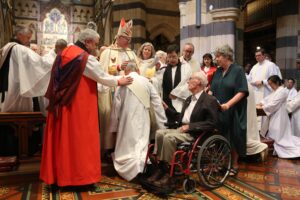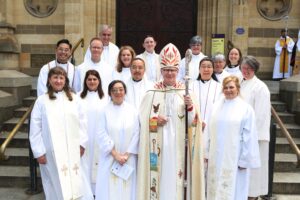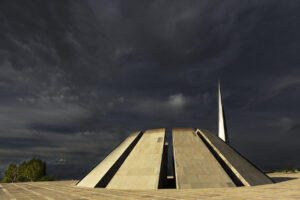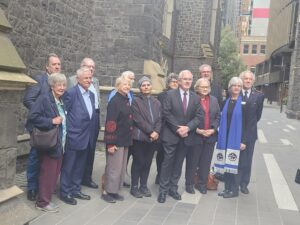Peter Adam and Peter Sherlock look at the case
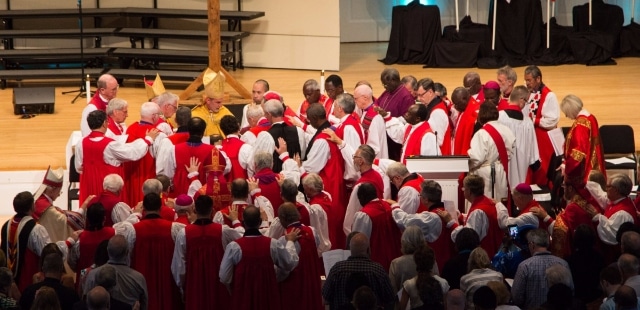
By Peter Adam and Peter Sherlock
5 September 2017
The ugly side of Anglican territorialism
Peter Adam
The consecration of Bishop Andy Lines for the Anglican Church of North America (ACNA) as missionary Bishop to Europe, by 50 bishops including 11 primates, has upset some Anglicans. They protest that this action opposes the 4th Century Canons of Nicaea, though it is not clear how those Canons apply to this situation, nor what authority they have today. [You can read them at http://www.newadvent.org/fathers/3801.htm].
The claim is made that Anglicanism is opposed to having more than one bishop in one territory. This claim is less plausible when seen in the light of the reality of Anglican practice.
Two distinct Jurisdictions
There are already two distinct and separate Anglican jurisdictions in Europe: each one with its own bishop. One is the Diocese of Europe, which is part of The Church of England. The other is the Convocation of Episcopal Churches in Europe, part of The Episcopal Church of USA. So, for example, in Paris there is St Michael’s which is part of The Church of England, and St George’s which is part of the USA Episcopal Church. You might well think that one Anglican Church in Europe is enough, and that more than one means schism. Apparently having two overlapping Anglican episcopal and diocesan structures is not out of the question! Perhaps this is an instructive model for the future. There is already room for two different expressions of Anglicanism in the same territory. Anglicanism is more flexible than first appears!
One Holy Catholic and Apostolic Church
When The Church of England set up its Diocese of Europe, and later when The Episcopal Church of the USA set up its Convocation of Episcopal Churches in Europe, they did so despite the fact that the territory of Europe was already covered by a network of Roman Catholic Dioceses and Eastern Orthodox churches. Presumably neither Anglican Church thought that the Roman Catholic Church and the Eastern Orthodox Churches were not part of the One Holy Catholic and Apostolic Church. Yet according to this use of the Nicene Canons, both were causing schism!
It is one thing to reform your own national Church, it is quite another to impose a Church which claims to be part of the Catholic Church where there is already a Catholic Church firmly in place!
Proprietorial and territorial Anglicanism not very attractive
The proprietorial face of Anglicanism is one of its most unattractive features. The Bishop of Australia, William Grant Broughton, refused to attend a reception at Government House in Sydney in the1840s, because the newly appointed Roman Catholic Bishop had taken the title Archbishop of Sydney. Over its history the Church of England has persecuted Jews, Protestants, Roman Catholics, Presbyterians, Baptists, Quakers, and Methodists, as well as many of its own.
To use an expression popular in contemporary Anglican ecclesiology, perhaps we should describe the recent ACNA consecration as nothing more than ‘an anomaly’. But it is no more anomalous than what is already in place. Proprietorial and territorial Anglicanism is not very attractive.
Furthermore, the purpose of the Nicene Creed and Canons was to preserve orthodoxy against current heresies. The purpose of Catholic order is to preserve Catholic faith. We would do well to pay more attention to faith than order!
The Revd Dr Peter Adam is Vicar Emeritus of St Jude’s Carlton.
Please scroll down for an opposing view.
Anglican hypocrisy exposed
Peter Sherlock
Some years ago I participated in an ecumenical conversation in which we were asked to affirm the integrity of our denominations. My refusal, on the grounds that Anglicanism has no denominational integrity, was greeted with sympathetic laughter.
Ever since the Church of England split from Rome, Anglicans have expounded their version of Gospel truth in a world full of competing visions of belief, Christianity, and Anglicanism itself.
This is especially pronounced in Melbourne, with its incredible cultural diversity. There are, for example, at least five Bishops or Archbishops of Melbourne besides our Anglican one. And there are Anglicans of every imaginable stripe.
I celebrate this rich diversity. I also mourn the underlying division that inhibits fellowship at the Lord’s Table, restrains a shared understanding of the Scriptures we love, and prevents a united witness to God’s justice and mercy.
Meanwhile, the Anglican Diocese of Melbourne is founded, like all Victorian institutions, on the fundamental principle of dispossession of the Kulin nations. Occasional Anglican concerns about parochial, diocesan or ecumenical boundaries pale before this unresolved injustice.
So when we learn that three Australian Anglican bishops participated in the consecration of a bishop (Andy Lines) in North America for another Church in another continent, what does it matter?
For me, the answer is not about proprietorial claims over land or people. Instead it is that we have become hypocrites. In a time and place in which authenticity is everything, hypocrisy is a grand indictment upon our Church, a grave barrier to sharing the good news of Jesus.
How are we hypocrites? We refuse to acknowledge that we deliberately break our own rules, rules that our bishops and clergy have sworn oaths to uphold. Some of our bishops ordain or license clergy who are in same-sex relationships. Other bishops have participated in the consecration of a bishop who is not in communion with the Anglican Church of Australia.
These episcopal acts arguably violate the Constitution of our General Synod, not only in relation to specific canons governing ordination or conduct, but in the fundamental requirement to uphold the teaching of Scripture as found in the 39 Articles and the Book of Common Prayer.
For we disagree profoundly about what that teaching is. We hold seemingly irreconcilable views on sexuality, sexual expression, and same-sex relationships, each side claiming the authority of Scripture.
And yet we carry on pretending, saying one thing and doing another, claiming we are loyal Anglicans while choosing which rules to break, acting as if we can live with differences that we say are of the first order.
The anomaly we face today is indeed the same one faced by our ancient forebears at Nicaea. Do Australian Anglicans still recognise each other as members of the One Holy Catholic and Apostolic Church? If we don’t, when – and how – are we going to stop pretending and go our separate ways?
But praise be to God, that Jesus died to save hypocrites like us.
Professor Peter Sherlock is the Vice-Chancellor of the University of Divinity.

